How to Invest in Share Market in India : 2024 Special Guide


I am writing these basic guide to start investing in share market in India. There is no recommendation to buy or sell any stock. All the stocks mentioned in this article are just for giving the example so you can understand the stock market investing principles. You should learn how to analyse the stocks and invest based on your own analysis.
I started investing in stocks in year 2006 when I got my first salary. I allocated a small amount of my monthly salary for investment. I learned the basics of intraday trading and long term value investing. It took me 3-4 years to get the confidence when I started putting more money into the stock market.
You should learn the basic fundamentals of stock market and then only take decision how you want to invest big amount in the stock market.
I have learned 3 ways to invest in the share market.
#1. Intraday Trading
Pick intraday trading if you are willing to –
- Invest around Rs. 10,000 (Be careful, there is a risk to lose the entire money in intraday trading)
- Give 10 hours of your dedicated time every week for learning day trading
- Commit to learn trading strategies (candlestick patterns and day charts)
You can make average Rs. 200-300 daily on your capital of Rs. 10,000 in the beginning. But you need to keep focus on preserving capital and trade with stop loss.
Your earnings will go up as you learn to trade better with time.
#2. Option Trading
Option trading is highly mis-understood concept in India. I feel that I started option trading very late, I could have made a huge profits early in life if someone would have mentored me.
There are two type of people who are successful in stock option trading
- Option Buyers, who start with less capital but have very sharp mind, quick decision makers, super disciplined and emotionless player. They spend more time in learning than actual trading.
- Option Sellers, who start with a huge capital but they have very less time for day trading. The biggest reason for their success is the patience to hold trade positions for a long time.
I would have loved to share everything that I learned in Options trading but this article is not focused on option trading strategies.
If you are interested in exploring the depth of Option Trading then start learning Strangle and Straddle strategies used by Option Sellers.
#3. Value Investing
Value investing means buying great businesses at the discounted price and keeping them in your portfolio for lifetime.
Warren Buffet had popularised this way of investing in the stock market.
You do not have to watch the stock movement everyday. You spend a lot of time analysing, researching and reading annual reports to find the undervalued stocks (less than intrinsic value).
Invest your money as soon as you find a beaten up stock (yet doing great business).
I will guide you on how to invest in the share market in India, starting from the basics.
- Why Investing in Stocks is Better Than Any Other Investment
- 5 Factors to Keep in Mind While Investing in Share Market
- 6 Steps to Start Investing in the Share Market for Beginners
- Step 1 – Choose a Trustworthy Stock Broker
- Step 2 – Open a Demat and Trading Account
- Step 3 – Transfer Money to Your Trading Account
- Step 4 – Place Your First Trade
- Step 5 – Learn to Analyze Stocks and Read Financial Statements
- Step 6 – Withdraw Money
- How to Start With a Small Investment of Rs. 10,000
- How to Invest in Stocks for Beginners with Little Money
- How to Invest in Tata Shares
- FAQ
- Conclusion
Why Investing in Stocks is Better Than Any Other Investment
Reason 1 – Primarily because it provides higher returns in the long run.
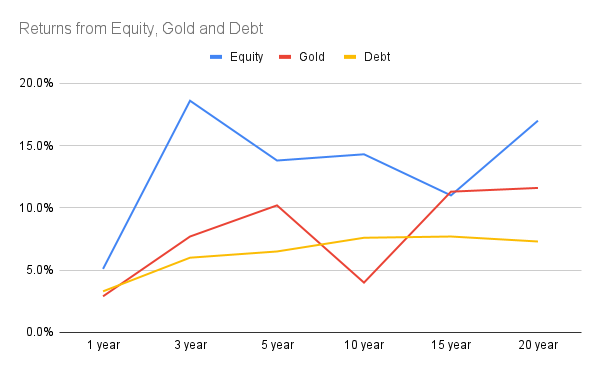
The stock market has a proven track record of providing better returns than any other investment, such as fixed deposits, gold, or real estate in the long run.
Reason 2 – Investing in stocks is more liquid as compared to other assets like real estate. Allowing you to easily convert your investment into cash.
You will have money in your bank the very next day.
Reason 3 – You can start investing in the stock market with as little as 500 Rupees.
PSEs (Public sector enterprises) and quality private companies share costs less than Rs.100.
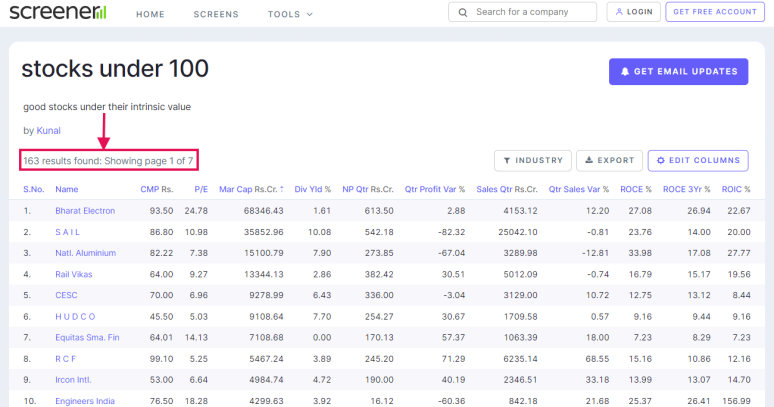
How Does Share Market Work
The share market works on the simple principle of demand and supply of stocks. The price of stock goes up when the demand is high because everyone wants to own good company stocks.
The price goes down when there is any negative news about the company.
A stock represents a share in a company, which is listed on the stock exchange. When you buy a stock, you are essentially buying a very small percentage of ownership in that company.
You get the right to vote on company matters and receive dividends when declared by the company.
NSE and BSE are the stock exchanges in India. The stock exchange acts as a platform for buyers and sellers to trade shares.
Multiple factors affect the supply & demand of a stock –
- Company earnings
- Sector performance
- Interest rates expectation
- Government regulations
- Economic scenario in the country
- Global financial events
5 Factors to Keep in Mind While Investing in Share Market
#1. Your Investment Goals
Investing for short-term goals (1-3 years) is like creating a corpus for buying an SUV.
Long-term goals (10+ years) mean creating a wealth corpus for children’s education.
The following questions will give a clear idea of what you want to achieve with your investments.
- What is the purpose of your investment?
- What is your investment horizon?
- How much risk are you willing to take?
| Investment Goal – Retirement | Time Horizon – 10+ years Risk – Low-risk Strategy – Long-Term Investment |
| Investment Goal – Luxury Car | Time Horizon – 3 years Risk – Higher risk Strategy – Short-Term Investment |
#2. Risk Appetite
It means how much capital you are willing to lose in case something bad happens to your stock portfolio.
In my opinion, young people have more risk appetite than middle aged men. My focus was to learn stock investment when I was 25 years and I was willing to lose upto 50% of my investment because I was having less responsibilities.
At the age of 35, my risk appetite become less because I had the responsibility of the family. But I learned enough about stock market that I could build a strong portfolio of good stocks.
#3. Research
Research helps you understand the in-and-out of the company and the factors affecting its earning potential.
Remember – you are a long-term shareholder in the company.
The more you know about the company the more you have confidence in your investment.
Take time to understand the company’s financials, management, industry trends, and any other relevant information.
#4. Diversification
Diversification is key to reducing risk in your investment portfolio. Invest in stocks across different sectors and companies to reduce the risk of losses.
You can invest a small portion (10-15% of your portfolio) in other assets like mutual funds & ETFs to spread your risk.
Rest of the 85-90% portion can be into shares across sectors and companies.
#5. Patience
Stock market is volatile, and share prices fluctuate in the short term.
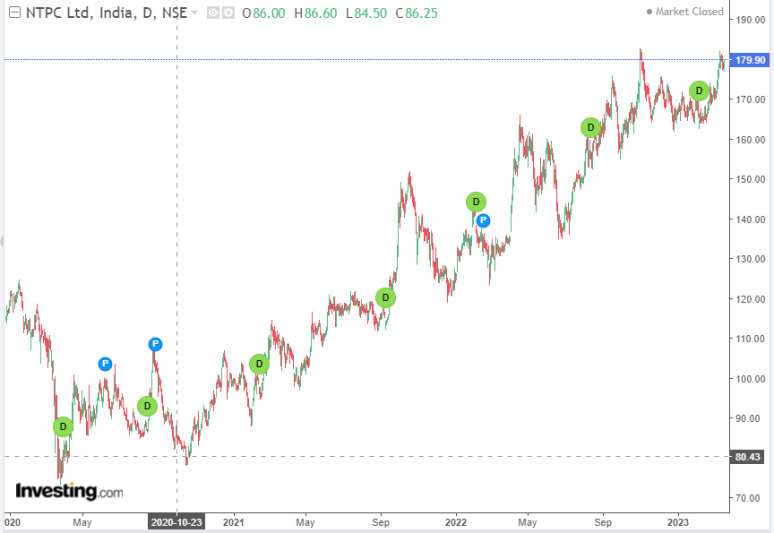
But in long term, the same stock can move in the up trend.
For example, the price of NTPC stock moved from Rs. 80 to Rs. 170 in 3 years.
It’s important to be patient and not panic during market downturns.
6 Steps to Start Investing in the Share Market for Beginners
Step 1 – Choose a Trustworthy Stock Broker
Brokers charge anywhere between 0.01% to 1% brokerage on the trading amount. I would suggest you to pick a discount broker that charge a fixed brokerage per trade rather than a percentage of trading amount.
You can choose any of the popular brokers in India – Zerodha, Upstox, 5Paisa and Angel Broking.
Factors to consider before choosing a stock broker
- brokerage fees
- ease of use
- fast trading platform
- customer support
Zerodha provides an easy to use and powerful Kite trading platform with a flat brokerage of Rs. 20 per trade. Zero brokerage on stock delivery for long term investment.
Step 2 – Open a Demat and Trading Account
Keep the following documents ready for online demat & trading account opening
- PAN card
- Aadhar
- Canceled cheque / Bank statement
- Signature (scanned copy)
- Income Proof (if you want to trade in F&O)
Last 6 months bank statement, latest salary slip, ITR acknowledgment or Form 16 can be uploaded as income proof.
Once your demat and trading account is opened, you can start buying and selling shares.
Step 3 – Transfer Money to Your Trading Account
UPI and Internet banking (net banking) can be used to transfer money from your savings account to your trading account.
Transfer around Rs. 1000 to experience stock trading. You can not make big profits with a small investment of Rs. 1000 but you can learn how to buy and sell stocks. Once you get the confidence in the stock trading then you can build a small portfolio of good stocks by investing more than Rs. 1,00,000.
There are no charges to transfer money using UPI in Zerodha trading platform.
Step 4 – Place Your First Trade
Pick one of the stocks from the list of Nifty 50 stocks.
The stock can be of a company that you can relate with, something that you use on daily basis, the brand you trust.
Wouldn’t you invest in a company whose products you love to buy?
- Maruti car
- Asian paints
- Britania biscuits
- HDFC Bank savings account
- Sun Pharma medicines
- Indian oil petrol
On the top left-hand side in Zerodha kite is a search option where you can find the stocks.
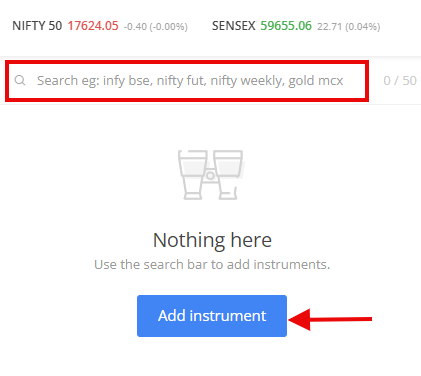
Using the option “Add instrument” you can create a watchlist of your favorite stocks. For example, type HDFC bank and click “+” to get HDFC bank shares on your watchlist.
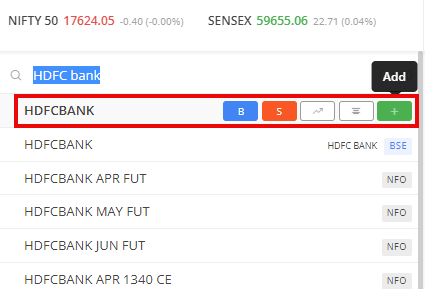
How to Place BUY Order in Zerodha
Click on the blue “B” buy button and a buy order form pops up.
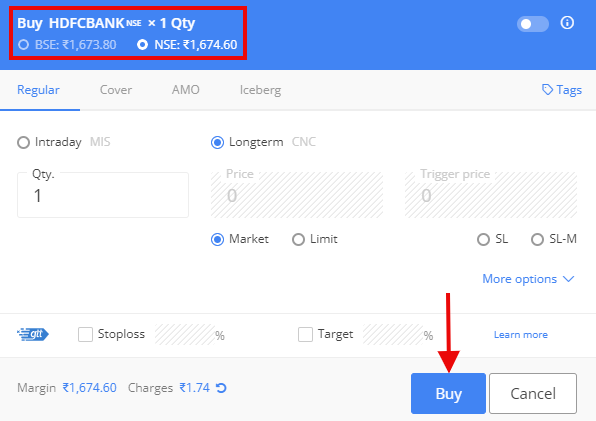
Intraday MIS order would be squared off at the end of the day automatically, means you should buy using Intraday MIS option only if you want to sell the shares on the same day itself. If you want to buy for long term then use the option Longterm CNC.
You can see the your shares under the “Positions” tab, Longterm CNC shares can be seen under “Holdings” tab on the next day.
How to SELL Shares
Select “- Exit” option under the three blue dots for the share that you want to sell as shown below.
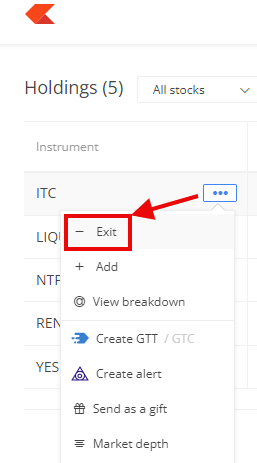
The example is for selling ITC shares. The process is the same for selling any other share.
A sell order form will pop up. Fill the quantity that you want to sell and click the sell button.
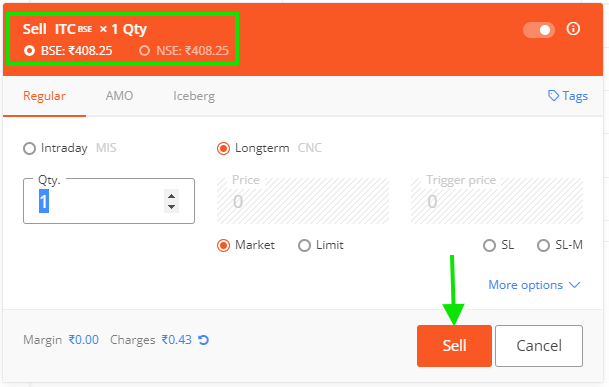
Step 5 – Learn to Analyze Stocks and Read Financial Statements
Information on the company’s financial performance, management, industry trends, and market conditions will help you make a better investment decision.
You can find this information in the company’s annual reports, quarterly earnings reports, and news articles.
Plenty of resources are available online to help you learn how to analyze stocks and read financial statements.
This includes financial news websites, stock market blogs, and online courses.
Few authentic examples to learn finance –
Blog – Safal Niveshak, Jagoinvestor, Basu Nivesh
News – Money Control
Twitter – @FI_InvestIndia
Youtube – Pranjal Kamra
Facebook Group – Asan Ideas for Wealth
Step 6 – Withdraw Money
There are NO charges for funds withdrawal at Zerodha.
It takes 24 hrs for the money to get credited to your bank from the cut-off time. 10 PM on weekdays (Saturday – 4.30 PM) is the cut-off time in Zerodha for placing fund withdrawal requests.
In case you miss the cut-off time, then your withdrawal request is processed the next working day.
How to Start With a Small Investment of Rs. 10,000
and Diversify Your Portfolio as Your Investment Grows to Rs. 5 Lacs
As a beginner, you should start with a small investment. You can gradually increase your portfolio size as you gain confidence, experience and knowledge.
Start building a diversified portfolio with an investment of just Rs. 10,000.
You can pick blue-chip stocks (shares of well-established companies) that have a track record of stable earnings and dividends.
An example portfolio may look like this.
| Shares | Quantity | Price | Invested Amount |
| Adani Enterprise | 1 | 1900 | 1900 |
| Aurobindo Pharma | 1 | 477 | 477 |
| HCL Tech | 3 | 1108 | 3324 |
| ICICI Bank | 1 | 831 | 831 |
| ITC | 10 | 385 | 3850 |
| Total | 10,382 |
Disclaimer: The stocks mentioned here is just for giving you an example for learning purpose. Please do not consider this as any recommendation to buy or sell. Do your own research before making any investment decision.
Percentage-wise your portfolio will look like –
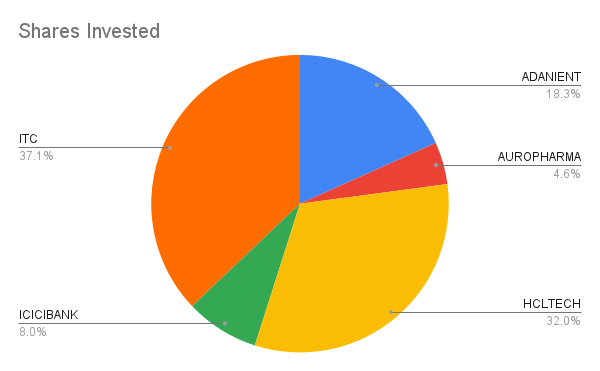
Having multiple shares (diversification) in different sectors will help you spread the risk arising from loss from any one share.
To diversify your portfolio, you can invest in 2 to 3 stocks from different sectors, mutual funds, and ETFs.
You can consider investing in mid-cap and small-cap stocks after thoroughly understanding the company and researching.
How to Invest in Stocks for Beginners with Little Money
Mutual funds and ETFs will help you indirectly invest in stocks if you have little money.
Mutual fund SIP (Systematic Investment Plan) can be done for as small as rupees 100 per month.
Listed ETFs on NSE price range from Rs. 18 to Rs. 2000.
Mutual funds and ETFs allow investment in a basket of stocks, bonds, and government securities.
Mutual funds are professionally managed investment portfolios that pool money from many investors to buy shares and other securities like bonds.
You don’t have to worry about stock research and analysis. The mutual fund manager does research, investment and management on your behalf. But you need to pay 0.5% to 2% of the money invested as management fees to the fund manager.
How to Invest in Tata Shares
17 companies of Tata Group are listed on stock exchanges in India.
Few of them are –
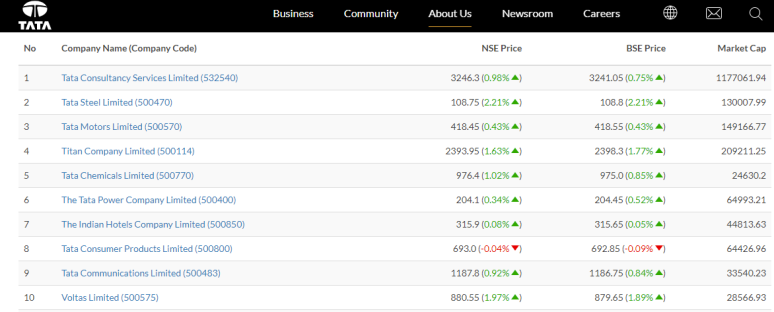
Disclaimer: The stocks mentioned here is just for giving you an example for learning purpose. Please do not consider this as any recommendation to buy or sell. Do your own research before making any investment decision.
To invest in Tata shares (in any one of the Tata companies) you can follow these steps –
- Transfer funds to your trading account
- Search for any of the Tata stocks
- Place your buy order.
Factors to Check Before You Pick a Particular Tata Stock
- Economic conditions – Growing or a slowdown in the economy will impact Tata’s profits and stock prices.
- Industry trends – Industry trends will impact Tata’s stock performance.
- Competition – Changes in the competitive landscape can impact Tata’s stock performance.
- Management changes – Changes in top management can impact Tata’s strategic direction and, consequently, its stock performance.
- Government policies – Government policies can impact Tata’s business operations, particularly in regulated industries like automobiles and steel.
FAQ
There is no fixed amount of money that you need to start investing in the share market.
You can start with as little as Rs. 100.
Start with small amounts and gradually increase your investments as you gain more experience and confidence.
Profit from stock market investments is subject to capital gains tax.
The tax rate depends on whether the gains are short-term (held for less than one year) or long-term (held for more than one year).
Short-term gains are taxed at your applicable income tax rate.
While long-term gains are taxed at a lower rate of 10% (without indexation benefit) or 20% (with indexation benefit) depending on the asset type.
Decision to buy or sell a stock should be based on a careful analysis of fundamentals, market trends, and your investment goals.
It is important to keep yourself informed about the latest news and trends in the market and track the performance of the companies you are interested in.
You can use technical and fundamental analysis tools to evaluate stocks and make informed decisions about buying or selling.
Risks associated with investing in the share market include –
- market risks,
- company-specific risks,
- liquidity risks, and
- inflation risks.
To lower risk – diversify your portfolio, invest in quality companies, and adopt a long-term investment approach.
Share price range from Re.1 to Rs. 83,000.
You need to pay brokerages to buy shares.
Discount brokers like Zerodha charge Rs. 0 brokerages for equity delivery.
Full-service brokers like ICICI direct charges 0.50% of the share buy value as brokerage.
There is no one-size-fits-all answer to this question.
The choice of stocks depends on your investment goals, risk appetite, and market conditions.
It is important to do your own research and analysis to identify quality companies with strong fundamentals, good management, and growth potential.
Profit from stocks requires careful analysis, research, and patience.
It is important to invest in quality companies with strong fundamentals, good management, and growth potential.
Adopt a long-term investment approach, diversify your portfolio, and avoid speculation or short-term trading.
Keep yourself informed about the latest news and trends in the market and track the performance of the companies you are interested in.
You can find stock-related information on various financial news websites, such as MoneyControl, Economic Times, and Bloomberg.
Trading price-related information can be viewed on your trading platform and also on NSE & BSE websites.
You can also subscribe to financial newsletters and consult with a financial advisor.
Yes, you can invest in the stock market with as little as Rs. 1000.
There are many options available for small investors, including mutual funds and exchange-traded funds (ETFs).
These options allow you to invest in a diversified portfolio of stocks even with a small amount of money.
Yes, you can invest Rs. 100 in the stock market. There are 100’s of shares with prices below Rs. 100.
But avoid penny stocks of companies that can disappear overnight.
Earning Rs. 5000 per day in the share market is not a realistic expectation.
The stock market is a volatile and unpredictable market, and it is impossible to predict with certainty how the market will perform on any given day.
Investing in the stock market is a long-term game, and it takes time and patience to build wealth through investments.
Conclusion
Investing in the stock market has its own risks and rewards. A hell lot of wealth can be created if you invest with discipline and hold good stocks for a long term.
Warren Buffet and Rakesh Jhunjhunwala have shown the potential of value investing to the world.
Invest in stocks that you understand and have thoroughly researched. Remember to diversify your portfolio to reduce risk and maximize returns.